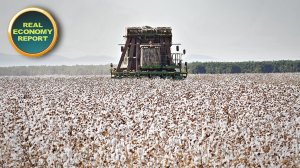Edcon supports revitalisation of clothing and textile industry
From Creamer Media in Johannesburg, this is the Real Economy Report.
Sashnee Moodley:
Clothing retailer Edcon increased its order for cotton lint to 2 200 t for the next year as part of its commitment to the clothing and textile industry, supporting the industry target of producing 60 000 t of cotton lint by 2020. Marleny Arnoldi tells us more.
Marleny Arnoldi:
The clothing industry in South Africa hit all-time production lows of only 5 000 t in 2013, which consequently had the country import 95% of its 315 000 t/y of cotton lint needs. The industry had since increased production to the current rate of 50 000 t/y of cotton lint, largely thanks to R200-million funding support from the Department of Trade and Industry between 2015 and 2019.
Loskop Cotton CEO Joseph Kempen says that currently most of South Africa’s cotton is beneficiated (weaved and spinned) outside of the country. If South Africa were to increase the local beneficiation of cotton to a level where import substitution of 50% is possible on four retail items – t-shirts, towels, chinos and underwear – then the industry could create 75 000 new jobs and inject R10-billion into the economy.
Kempen tells us more about the industry that was once the second-largest employer in South Africa.
Loskop Cotton CEO Joseph Kempen:
Marleny Arnoldi:
Government contributions so far included upgrades to Loskop Cotton ginnery, outside Marble Hall in Limpopo, as well as investments into 11 cotton strippers and 24 cotton pickers. A cotton picking machine costs around R12-million, but harvests between 15 ha to 20 ha a day.
Kempen says a farmer needs at least 1 000 ha of cotton fields under irrigation to make the capital investment into the machine viable, therefore farmers often consolidate to purchase one machine to work on their respective farms.
He further says that the Loskop ginnery has the capacity to gin 45 bales of cotton per hour, with one such bale weighing around 2 200 kg.
With retailers such as Edcon supporting the Sustainable Cotton Cluster, an industry-initiative that was created alongside government’s investment - it ensures the increased use of local materials to manufacture clothing in South Africa.
Kempen explains that a batch of cotton comprises around 36% cotton, 54% cottonseed and the balance is waste, presenting alternative opportunities to use cottonseed and cotton waste in earbuds, cosmetics including lipstick, and feed for cattle. He discusses the price for pure cotton and alternative opportunities in more detail.
Loskop Cotton CEO Joseph Kempen:
Sashnee Moodley:
That’s Creamer Media’s Real Economy Report. Join us again next week for more news and insight into South Africa’s real economy. Don’t forget to listen to the audio version of our Engineering News daily email newsletter.
Article Enquiry
Email Article
Save Article
Feedback
To advertise email advertising@creamermedia.co.za or click here
Press Office
Announcements
What's On
Subscribe to improve your user experience...
Option 1 (equivalent of R125 a month):
Receive a weekly copy of Creamer Media's Engineering News & Mining Weekly magazine
(print copy for those in South Africa and e-magazine for those outside of South Africa)
Receive daily email newsletters
Access to full search results
Access archive of magazine back copies
Access to Projects in Progress
Access to ONE Research Report of your choice in PDF format
Option 2 (equivalent of R375 a month):
All benefits from Option 1
PLUS
Access to Creamer Media's Research Channel Africa for ALL Research Reports, in PDF format, on various industrial and mining sectors
including Electricity; Water; Energy Transition; Hydrogen; Roads, Rail and Ports; Coal; Gold; Platinum; Battery Metals; etc.
Already a subscriber?
Forgotten your password?
Receive weekly copy of Creamer Media's Engineering News & Mining Weekly magazine (print copy for those in South Africa and e-magazine for those outside of South Africa)
➕
Recieve daily email newsletters
➕
Access to full search results
➕
Access archive of magazine back copies
➕
Access to Projects in Progress
➕
Access to ONE Research Report of your choice in PDF format
RESEARCH CHANNEL AFRICA
R4500 (equivalent of R375 a month)
SUBSCRIBEAll benefits from Option 1
➕
Access to Creamer Media's Research Channel Africa for ALL Research Reports on various industrial and mining sectors, in PDF format, including on:
Electricity
➕
Water
➕
Energy Transition
➕
Hydrogen
➕
Roads, Rail and Ports
➕
Coal
➕
Gold
➕
Platinum
➕
Battery Metals
➕
etc.
Receive all benefits from Option 1 or Option 2 delivered to numerous people at your company
➕
Multiple User names and Passwords for simultaneous log-ins
➕
Intranet integration access to all in your organisation

















